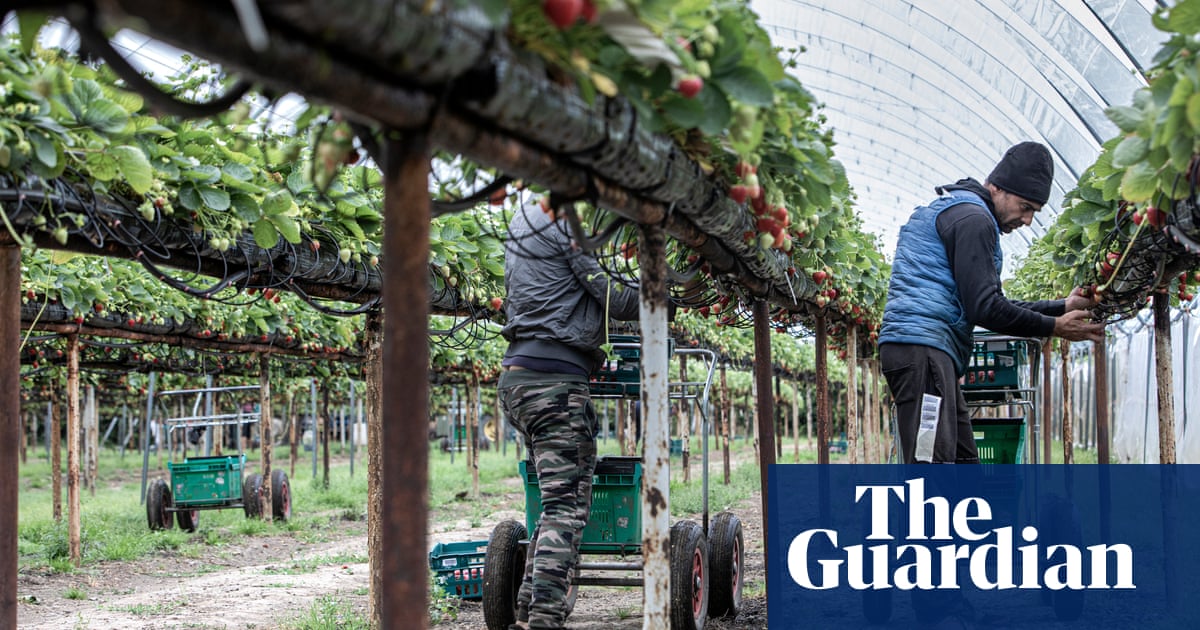The environment secretary, Steve Reed, is to announce a five-year extension of the seasonal farm worker scheme in an attempt to reset relations with farmers after fury over inheritance tax.
Making his pitch to farmers at the National Farmers’ Union conference in central London on Tuesday, Reed will also announce the opening of a new national biosecurity centre to tackle diseases including foot-and-mouth and bluetongue.
There was widespread anger over the government’s decision to change the terms of the inheritance tax arrangements for farms, an announcement in Rachel Reeves’ spring budget that took the sector by surprise.
Farmers argued that the changes could destroy their family businesses, and some tax experts said it was badly thought through. But others have argued that there are loopholes around inheritance tax for farms that do need to be tackled.
The environment secretary has since been working to restore relations. Reed, the secretary of state for environment, food and rural affairs, is expected to say: “The underlying problem is that farmers do not make enough money for the hard work and commitment they put in. I will consider my time as secretary of state a failure if I do not improve profitability for farmers across the country.
“My focus is on ensuring farming becomes more profitable because that’s how we make your businesses viable for the future. And that’s how we ensure the long-term food security this country needs.”
Environment secretaries have faced a chilly reception before at the conference, and Reed’s Tory predecessor Thérèse Coffey was booed when she addressed farmers in 2023.
Speaking at the conference will be the CBI chair, Rain Newton-Smith, who will target the government over the inheritance tax changes. She will say: “You’ve been battling so many challenges … most recently, changes to inheritance tax and business property relief at the budget, which the NFU has said could affect 75% of farms. Some see those solely as personal taxes, but farming is an industry where the professional is deeply personal. And I know so many of you are fearful of the impact – fearful you can’t pass livelihoods on to future generations.”
The NFU president, Tom Bradshaw, will also give a highly critical speech, accusing the government of breaking promises with its “morally wrong” inheritance tax policy, urging ministers to “do the right thing” and reverse it. The Guardian understands there is due to be a protest at the conference against Reed and the inheritance tax proposals.
Reed will also be promising farmers a £110m investment in farming technology and new requirements for government catering contracts buy British produce.
The NFU has been asking for an extension to the seasonal worker scheme for some time. Before Brexit, when freedom of movement between the UK and the EU ended, the farming sector was almost entirely reliant on EU workers to come and pick fruit and vegetables during harvest months. The seasonal work meant workers would come to the UK to take up the short-lived roles, then return to their home country when the job finished.
After Brexit this was impossible, as there was no proposed route for so-called low-skilled workers, until, pushed into action, the government set up a temporary seasonal worker scheme to import workers for six months at a time.
When the scheme was due to end in 2021, the NFU successfully lobbied for a three-year extension to 2024. At the end of last year, the Labour government confirmed the seasonal worker visas would be going ahead in 2025. The NFU estimated £60m worth of food was wasted in the first half of 2022 because of a lack of pickers.
The scheme is limited to an annual quota of 45,000-55,000 workers, who can only stay for six months, do not have access to public funds and cannot bring family members with them.
The government is hoping that in time it can curb the scheme by rolling out robots that can pick fruit and vegetables across farms in England. However, the technology for this is in its early stages and there are many types of farm on which it will not yet work at scale.
Article by:Source: Helena Horton Environment reporter














